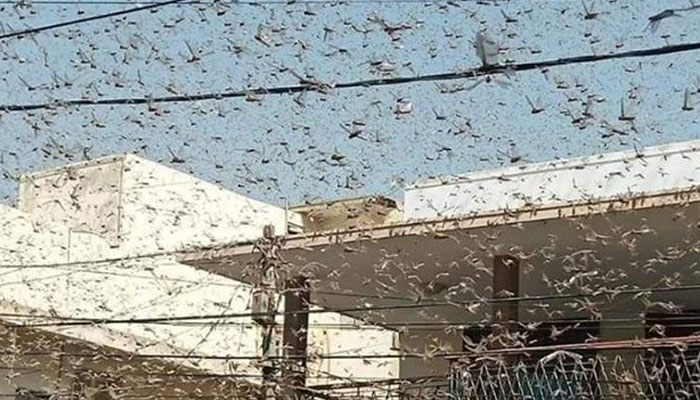Locust swarms seem to have left Karachi, says official
Swarms of locusts, locally known as Tiddi Dal, that hit Karachi and its adjoining areas on Monday seemed to have left the city on Tuesday after causing damage to crops in Gadap Town.
According to Ministry of National Food Security and Research Director Technical of Plant Protection Muhammad Tariq Khan, the locusts were observed in suburbs of Karachi such as Gadap Town on Tuesday, after which they apparently left towards Balochistan. He, however, did not rule out the possibility of more locusts flying through Karachi in the next few days.
The swarms of locusts are believed to have made their way to the metropolitan city after a span almost 57 years due to favourable weather in the region during their breeding season of August.
In a video statement, Sindh Agriculture Minister Ismail Rahoo said the locusts were heading to Balochistan after spending the night in Karachi. Informing about locusts, Khan said locusts are found in desert areas. He said they were monitoring the situation and added that the insects are not usually harmful.
He explained that the locust activity observed in Malir and adjoining areas of Karachi is in fact migration from the summer monsoon breeding zone towards coastal areas of Balochistan that is the breeding zone for them in the winter and spring. “Desert locusts fly during daytime and settle during night,” he said, adding that such migrations usually do not cause damage to the crops, as the insects are not in search of food.
However, an agriculturist in Gadap Town, Adil, shared with The News how his crops were eaten by the locusts. His orchid is inside Gadap City near the Thaddo Dam, where, he said that the locusts damaged his crops.
On Monday, the provincial government directed relevant officials to spray on crops in District Malir. The Quaid-e-Azam Trophy fixture between Sindh and Northern was also interrupted briefly on Monday when a locust swarm showed up while the Northern were batting.
The swarm was large enough that the players had to stop playing and cover their eyes and ears in a bid to avoid contact with the insects. Rahoo on Monday said their teams were already in the field and equipped with sprays. The federal government’s plant protection department, which he shared is mandated to control locusts by doing aerial spray and field visits, was also on standby.
Rahoo said the director general of the plant protection department had visited Karachi and held a meeting with the officials of the Sindh Agriculture Department.
“We asked him to conduct aerial spray in Nawabshah’s desert area,” he said, adding that in Mithi, Badin district, the agriculture department’s teams are spraying the fields to get rid of locusts.
According to Rahoo, the people of Karachi can cook and eat locusts. “They aren’t harmful for citizens at all,” he said. Horticulturist Tofiq Pasha also shared that people can fry or have locusts as a barbecue item. They can also have it in Karhai or biryani.
Meanwhile, the Karachi Metropolitan Corporation’s Parks Director General Afaq Mirza told The News that grasshoppers generally devour vegetables grown in fields, and all their parks are completely safe from their attack. However, Pasha shared that locusts can devour grass and all the leaves of a tree if they are in huge numbers.
-
 James Van Der Beek's Friends Helped Fund Ranch Purchase Before His Death At 48
James Van Der Beek's Friends Helped Fund Ranch Purchase Before His Death At 48 -
 King Charles ‘very Much’ Wants Andrew To Testify At US Congress
King Charles ‘very Much’ Wants Andrew To Testify At US Congress -
 Rosie O’Donnell Secretly Returned To US To Test Safety
Rosie O’Donnell Secretly Returned To US To Test Safety -
 Meghan Markle, Prince Harry Spotted On Date Night On Valentine’s Day
Meghan Markle, Prince Harry Spotted On Date Night On Valentine’s Day -
 King Charles Butler Spills Valentine’s Day Dinner Blunders
King Charles Butler Spills Valentine’s Day Dinner Blunders -
 Brooklyn Beckham Hits Back At Gordon Ramsay With Subtle Move Over Remark On His Personal Life
Brooklyn Beckham Hits Back At Gordon Ramsay With Subtle Move Over Remark On His Personal Life -
 Meghan Markle Showcases Princess Lilibet Face On Valentine’s Day
Meghan Markle Showcases Princess Lilibet Face On Valentine’s Day -
 Harry Styles Opens Up About Isolation After One Direction Split
Harry Styles Opens Up About Isolation After One Direction Split -
 Shamed Andrew Was ‘face To Face’ With Epstein Files, Mocked For Lying
Shamed Andrew Was ‘face To Face’ With Epstein Files, Mocked For Lying -
 Kanye West Projected To Explode Music Charts With 'Bully' After He Apologized Over Antisemitism
Kanye West Projected To Explode Music Charts With 'Bully' After He Apologized Over Antisemitism -
 Leighton Meester Reflects On How Valentine’s Day Feels Like Now
Leighton Meester Reflects On How Valentine’s Day Feels Like Now -
 Sarah Ferguson ‘won’t Let Go Without A Fight’ After Royal Exile
Sarah Ferguson ‘won’t Let Go Without A Fight’ After Royal Exile -
 Adam Sandler Makes Brutal Confession: 'I Do Not Love Comedy First'
Adam Sandler Makes Brutal Confession: 'I Do Not Love Comedy First' -
 'Harry Potter' Star Rupert Grint Shares Where He Stands Politically
'Harry Potter' Star Rupert Grint Shares Where He Stands Politically -
 Drama Outside Nancy Guthrie's Home Unfolds Described As 'circus'
Drama Outside Nancy Guthrie's Home Unfolds Described As 'circus' -
 Marco Rubio Sends Message Of Unity To Europe
Marco Rubio Sends Message Of Unity To Europe




